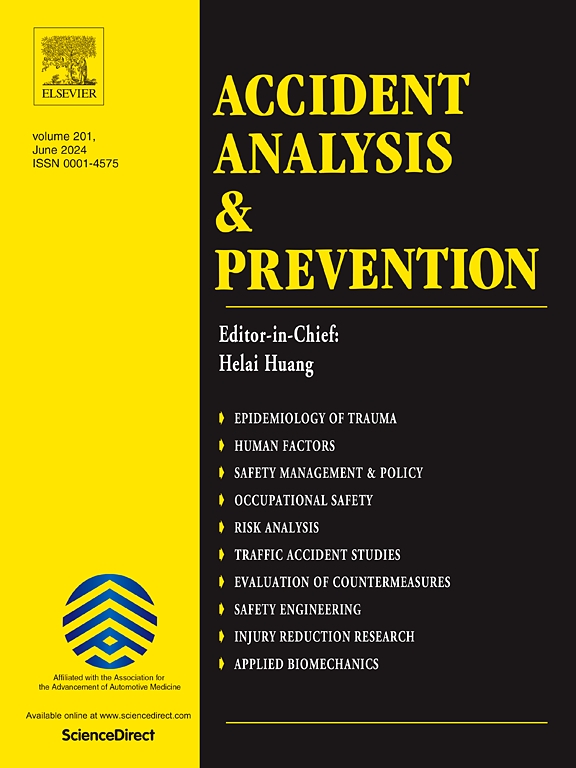Young Motorcyclists’ Behavior Analysis in Pakistan based on Modified Motorcycle Rider Behavior Questionnaire (MRBQ)
IF 6.2
1区 工程技术
Q1 ERGONOMICS
引用次数: 0
Abstract
In many low- and middle-income countries, including Pakistan, young motorcyclists are overrepresented in crashes, primarily due to risky behaviors. To examine these behaviors, the Motorcycle Rider Behavior Questionnaire (MRBQ) has been modified for young motorcyclists in Pakistan to better capture the unique and culturally relevant behaviors affecting their safety. In addition, the study seeks to identify the factor structure of the MRBQ tailored for young motorcyclists in Pakistan, explore the determinants of self-reported incidents (i.e., crashes, near crashes, and violations), and provide effective policy recommendations to enhance road safety. For this purpose, data are collected from 721 young motorcyclists across Pakistan. In addition, exploratory factor analysis was conducted to determine the underlying factor structure of the adapted MRBQ, while a multivariate binary probit model was employed to assess the determinants of self-reported incidents. The findings reveal a five-factor solution comprising safety violations, speeding violations, traffic errors, stunts, and control errors, which differ from previous studies. Notably, “safety violations” emerge as the most significant factor, highlighting the prevalence of risky behaviors among young motorcyclists in Pakistan. In addition, the study indicates that young motorcyclists with lower levels of education, lack a valid riding license, or ride motorcycles with higher engine capacities and for longer durations are more likely to experience crashes, near crashes, and violations. The MRBQ factors, particularly safety violations, speeding violations, and traffic errors, substantially increase the risk of these incidents among young motorcyclists in Pakistan. These findings highlight the importance of addressing both sociodemographic and MRBQ factors in reducing risky riding behaviors among this vulnerable group. The study also offers several policy recommendations to promote safe behaviors and reduce the risk of crashes and injuries among young motorcyclists in Pakistan and other regions with similar contexts.
基于修正摩托车骑手行为问卷(MRBQ)的巴基斯坦青年摩托车骑手行为分析。
在包括巴基斯坦在内的许多低收入和中等收入国家,年轻的摩托车手在车祸中所占比例过高,这主要是由于危险行为。为了检查这些行为,我们针对巴基斯坦的年轻摩托车手修改了摩托车骑手行为问卷(MRBQ),以更好地捕捉影响他们安全的独特和文化相关行为。此外,该研究旨在确定为巴基斯坦年轻摩托车手量身定制的MRBQ的因素结构,探索自我报告事件(即碰撞、接近碰撞和违规)的决定因素,并提供有效的政策建议,以加强道路安全。为此,收集了巴基斯坦721名年轻摩托车手的数据。此外,我们还进行了探索性因素分析,以确定适应性MRBQ的潜在因素结构,并采用多元二元概率模型来评估自我报告事件的决定因素。研究结果揭示了一个五因素解决方案,包括安全违规、超速违规、交通错误、特技和控制错误,这与以往的研究不同。值得注意的是,“违反安全规定”是最重要的因素,突出了巴基斯坦年轻摩托车手中危险行为的普遍存在。此外,该研究还表明,受教育程度较低、缺乏有效驾驶执照、或驾驶发动机容量较大、驾驶时间较长的摩托车的年轻摩托车手更容易发生撞车、险些撞车和违规行为。MRBQ因素,特别是安全违规、超速违规和交通错误,大大增加了巴基斯坦年轻摩托车手发生这些事件的风险。这些发现强调了解决社会人口统计学和MRBQ因素在减少这一弱势群体的危险骑行行为中的重要性。该研究还提出了几项政策建议,以促进巴基斯坦和其他具有类似情况的地区的年轻摩托车手的安全行为并减少碰撞和受伤的风险。
本文章由计算机程序翻译,如有差异,请以英文原文为准。
求助全文
约1分钟内获得全文
求助全文
来源期刊

Accident; analysis and prevention
Multiple-
CiteScore
11.90
自引率
16.90%
发文量
264
审稿时长
48 days
期刊介绍:
Accident Analysis & Prevention provides wide coverage of the general areas relating to accidental injury and damage, including the pre-injury and immediate post-injury phases. Published papers deal with medical, legal, economic, educational, behavioral, theoretical or empirical aspects of transportation accidents, as well as with accidents at other sites. Selected topics within the scope of the Journal may include: studies of human, environmental and vehicular factors influencing the occurrence, type and severity of accidents and injury; the design, implementation and evaluation of countermeasures; biomechanics of impact and human tolerance limits to injury; modelling and statistical analysis of accident data; policy, planning and decision-making in safety.
 求助内容:
求助内容: 应助结果提醒方式:
应助结果提醒方式:


